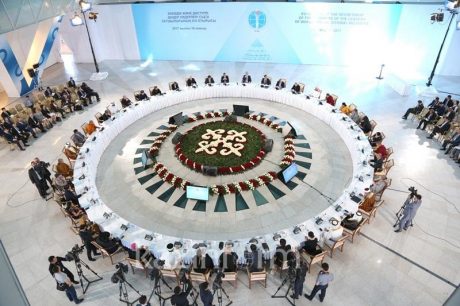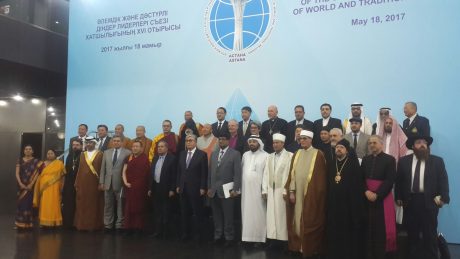Remarks delivered by Matthew Hodes
Director of the United Nations Alliance of Civilizations
at the Congress of Leaders of World and Traditional Religions
Astana, 17 May 2017
Your Excellency Mr. Kassym-Jomart Tokayev, Head of the Secretariat of the Congress of the Leaders of World and Traditional Religions,
Excellencies,
Distinguished faith leaders,
Ladies and Gentlemen,
First, I would like to thank His Excellency Mr. Nursultan Nazarbayev, President of the Republic of Kazakhstan for organizing this initiative and for his continuing leadership in the field of interreligious dialogue. He continues to promote dialogue between the various leaders of world and traditional religions and faiths. His initiative launching the first Congress of Leaders of World and Traditional Religions in 2003 marked an important step towards strengthening the process of spiritual rapprochement among the peoples of the world.
I would also seize the opportunity to express my sincere thanks to Mr. Kassym-Jomart Tokayev, Chairman of the Senate of the Parliament of the Republic of Kazakhstan and Head of the Secretariat of the Congress of the Leaders of World and Traditional Religions, for his leadership as well as for his willingness of providing me and the Alliance of Civilizations with guidance as a member of my Advisory Council.
The Alliance of Civilizations is committed to the use of intercultural and interreligious dialogue as a means of building understanding between identity groups. Dialogue leads to understanding and understanding leads to reduced polarization. By pursuing these goals UNAOC can contribute to diminishing tensions, preventing and resolving conflicts, and therefore promoting peace and understanding.
We live in a world where extremism and terrorism are threatening the global security landscape, transcending national borders, and hijacking religions to spread destructive messages. Therefore, the engagement of religious leaders is essential to counteract the messages of the leaders of terrorist groups who distort the core of religious beliefs for self-serving purposes. We need religious leaders to assert their rejection of violent doctrines and emphasize the peaceful and tolerant values inherent in their theologies.
Responding to violent extremism was the original purpose behind the idea of Kofi Annan in creating the Alliance of Civilizations. More than ten years ago we saw its sickening impact in New York, Washington, London, Madrid and Bali, not to mention across Iraq. Since then, while the locations may have changed and the actors may have changed, the problem remains.
Violent Extremism is a plague that eats at the core of our societies. It threatens our security and it jeopardizes our fundamental principles and values. Violent extremists use perverse interpretations of religious scriptures to justify the horror of their acts.
UNAOC continues to promote the role of religious leaders to promote the values of peace and coexistence. Last year in Alicante in Spain, I co-hosted a meeting of religious leaders from the Holy Land precisely to engage them on this issue and encourage them, as teachers and mentors, to fulfill their traditional roles. They are the ones who can convey messages of moderation. They are the ones who understand the unifying power of shared humanistic values that religions promote.
The Secretary-General’s Plan of Action on Preventing Violent Extremism recognizes the importance of faith. It encourages religious and community leaders to mentor “vulnerable followers so as to enable them to reject violent ideologies” and promote “tolerance, understanding and reconciliation between communities”.
Our engagement with religious leaders is a long-term commitment. Our 7th UNAOC Global Forum held in Baku last April dedicated a whole session on the role of religious leaders in contributing to inclusive and peaceful societies. And through the adoption of the Baku Declaration, we committed to further engage with religious leaders and provide them with opportunities for interfaith dialogue to promote tolerance and act as messengers of peace.
The battle for ideas, for ideals, for values, never ends. Religious leaders must lead in promoting the highest standards of tolerance and coexistence. Only through their relentless pursuit of enlightenment can they play their highest role in eliminating the scourge of violent extremism.
We must stand by them in facing these challenges and support their endeavors. The Alliance is committed to work closely with faith and community leaders who are committed to prevent violent extremism, and to empower them to play an effective role.
Thank you.


